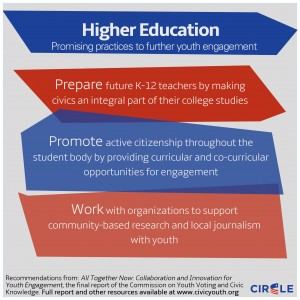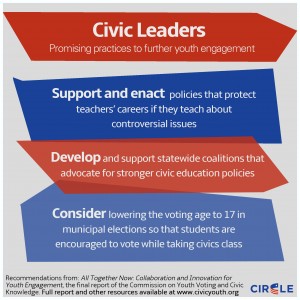Crucial Role for Higher Ed in Building Youth Civic Engagement

There are deep inequalities in youth civic knowledge and participation across socioeconomic levels that must be addressed to strengthen our democracy, and there is a vital role for universities and other institutions of higher education, not only in promoting youth engagement, but also closing this gap.
A Call to Civic Leaders: Collaboration, Advocacy, and Reform

Improving civic education and increasing youth engagement in the United States requires work at every level from all members of society. Civic leaders—elected officials, policy makers, heads of influential organizations, and others—are in a unique position to promote and champion vital, substantive improvements.
Did Civic Education Laws Affect Youth Turnout in 2012?

One of the ways that states may try to influence political engagement is by requiring civic education in their K-12 schools. Substantial evidence shows that high-quality civic education boosts students’ interest in politics, their knowledge of political issues, and their voter turnout after they turn 18. But it is less clear that the existing state Read More >
Redefining Civic Knowledge?
To participate in civic life, young people need skills and knowledge. Since the 1970’s, changes in the political environment and the ways we communicate and problem-solve together (especially using technology) have added new forms of knowledge and skills that are useful for effective participation. CIRCLE’s 2010 report entitled “Civic Skills and Federal Policy” lists some Read More >
Is contemporary history taught in schools?

This week, CIRCLE released a new fact sheet entitled “State Civic Education Requirements,” a scan of civic education-related standards and requirements in every state and the District of Columbia. All states have social studies standards that describe the essential knowledge and skills that students need for citizenship, work, and higher education. (Civic education can occur Read More >




